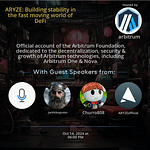This space is hosted by w3ggofficial
Space Summary
Questions
Q: What are the primary challenges discussed in the space?
A: The main challenges included _ and _.
Q: How can individuals or businesses address these challenges?
A: Strategies such as _ and _ were recommended for overcoming these challenges.
Q: What were the key trends highlighted during the session?
A: The latest trends discussed were _ and _.
Q: How does technology influence the niche topic?
A: Technology plays a significant role by _.
Q: What regulatory considerations were emphasized?
A: Regulatory considerations included _ for ensuring compliance and best practices.
Q: What role does community collaboration play in the niche?
A: Community collaboration is essential for _ and _.
Q: What were the key technological advancements discussed?
A: Technological advancements such as _ were explored for their impact on the niche.
Q: How important is innovation for success in this field?
A: Innovation was highlighted as crucial for _ and _.
Q: How can one ensure adaptability in the face of changing trends?
A: Adaptability can be maintained through _ and _ strategies.
Q: What were the forward-looking predictions shared by experts?
A: Experts predicted _ for the future developments in the niche.
Q: What were the key takeaways for listeners from the Twitter space?
A: Key takeaways included _ and _ to help listeners navigate challenges and seize opportunities in the niche.
Highlights
Time: 00:00:52
Introduction and overview of the session.
Time: 00:05:00
Discussion on the importance of _ and initial thoughts.
Time: 00:10:00
Insights into current challenges faced in _.
Time: 00:14:30
Strategies and solutions for common issues in _.
Time: 00:19:00
Exploring the latest trends and their implications.
Time: 00:23:20
Case studies and real-world examples.
Time: 00:28:00
Predictions about future developments.
Time: 00:32:30
The role of community and collaboration.
Time: 00:37:00
Technological advancements and their impact.
Time: 00:41:40
Regulatory and compliance aspects.
Key Takeaways
- High engagement and interaction among speakers and participants set an informative tone for the session.
- The space emphasized practical steps
- expert opinions
- and forward-looking predictions to benefit listeners.
- Real-world examples and case studies were used to illustrate key points and provide tangible insights.
- The session explored evolving trends
- technological advancements
- regulatory aspects
- and best practices.
- Community collaboration and innovation were highlighted as essential elements for success in the field.
- Adaptability and staying informed about latest trends were underscored as crucial for navigating the landscape.
- The role of technology
- regulatory compliance
- and community support were discussed in detail.
- Forward-looking statements and expert predictions offered perspectives on future developments in the niche.
- Strategies for overcoming challenges and leveraging opportunities were shared by the speakers.
- Participants were encouraged to embrace innovation and adaptability in the rapidly changing environment.
Behind the Mic
The conversation is interesting because, you know, both of you mentioned that there's been a huge change in the way people look at gaming now. What has changed over the years? Can you share your thoughts on this? Yeah, sure. I mean, I think historically, video games, you know, I'm going to date myself here, but, you know, back in the 80s and 90s, you know, this was more of a niche, you know, nerd hobby, to be honest. And, you know, we weren't as mainstream as some of the other hobbies of people growing up. And so, you know, as the industry grew more and more and generations latched on to video gaming, nowadays, you know, it's mainstream entertainment. It's part of pop culture. And a lot of that is driven by technology advances, graphic advances. And then, of course, unlocking online gaming has been a huge component of this. And so, we're at this point where not only is it mainstream, but I think we're actually sort of at this, like, positive turning point where with the pandemic, you know, people seeing games not only as mainstream entertainment, but also as a way to remain connected. And I think this last few years was a big sort of win for the gaming community because, you know, not only is it mainstream, but it's also recognized as almost like a virtual community. Yeah. And, you know, even before the pandemic and our, I guess, kind of critical point has changed due to the pandemic, eSports has taken off, right? So, if you look at the late 2010s and late 2000s, eSports was really a foothold for people to be excited about entertainment. And then, of course, with the pandemic, now gaming is just absolutely exploded where people resorted to gaming as a way to stay connected, stay engaged. And it became not only a form of mainstream entertainment, but also a way of creating virtual economies where people are spending real money in games and now with blockchain, creating real value. Is that a fair statement to say? Absolutely, absolutely. I think that's well said. And I think if we think about just the last few years, a lot of trends are emerging in gaming. And not only eSports, like we mentioned, but, you know, live streaming and influencer culture, as well as, you know, metaverse type virtual worlds where people kind of live out their virtual lives. And then, of course, like you mentioned, blockchain and video games, you know, NFTs, play-to-earn models. And I think what's really exciting about that is, you know, it's sort of taking gaming to a whole nother level where people see it not only as, you know, something to pass the time, but you could actually earn money. And like you mentioned, it becomes a virtual economy with real world value. Yeah, definitely. Like would be curious to know from you, Joe, you've been in the industry for so long. When you think about those trends we just mentioned, what is the most exciting thing for you out of all these trends? Yeah, sure. So I think one of the most exciting things for me is, you know, when you think about blockchain technology and video games, you know, I think there's this really cool dynamic where, you know, this concept of asset ownership, right? You know, in the past you'd play World of Warcraft or you'd play some of these games and you'd acquire assets in the game. But at the end of the day, it's just a UI showing something and it's really not yours. And I think with blockchain technology, you know, this concept of digital asset ownership where, you know, I can own this asset on a blockchain, it's mine and I can trade it. I can sell it. And I think, you know, we're just starting to scratch the surface of what that really means and what that can unlock in the future. And then the other thing I'm super excited about is when you think about these play-to-earn models, right? Like, you know, a lot of people in developing countries or in places where, you know, there might not be a lot of economic opportunity, you know, they can actually make a living or participate in a virtual economy and create some value there. And so I think that's really cool and really exciting. And again, we're just scratching the surface of what's possible. Yeah. Yeah. And I think, you know, when you think about where these come from, certainly people talk about the future not being evenly distributed right now and it's XYZ, but also hold these significant power to actually dictate what the next wave of gaming when you think about e-sports and whatnot. So just very curious to know, like, as you've been in gaming, how do you find that intersection? Like, how do you find the next big winners in gaming? Yeah, sure. So I think it's hard to predict, right? I think there's a lot of different factors that go into it. But I think one of the things that we've seen is, as the industry evolves, it's just rapidly disrupting every few years where, you know, something like e-sports becomes huge or, you know, something like really high quality live streaming becomes huge. And I think one of the key things to look for is you got to look for where there's going to be mass adoption. And I think one of the things that we learned in the last few years is, you know, people are looking for new ways to stay connected and new ways to experiences that are a little bit different than, you know, what they have in their day-to-day lives. And so I think if we look for, you know, what's going to disrupt the industry next, continue to look for where people want to stay connected, they want to create these shared experiences with each other and then build it out from there. Awesome, Joe. Great insights. I am so very lucky to have you here with us today. Really privileged to get to hear from you and get your thoughts. Before we end off, I just want to know maybe if you have some thoughts on how we could prioritize the communities before anything else? Because I think it's time for all gamers to come together. Stay united. Show the world that we are not bots, we are real people. We know what we're doing. We are savvy, not only in games, but also in real world and financially. With that, I shall leave you guys to it. And we'll see you guys very soon. Thank you very much everyone for staying tuned. And thank you everyone for repeating this recording. And once again, thank you so much, Joe, for being here with us. Yeah, thank you. And yeah, you know, I got. I got myself a Ouija g bag as well. Right? So I'm excited for the preset. Awesome. So thank you, thank you. Have a great day, everyone. Good night. Bye.







